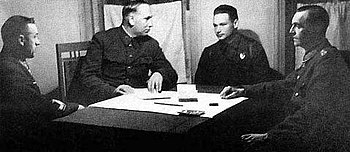.
Nikolay Dmitrevich Dyatlenko was one of the Red Army represantants who
attempted to deliver an ultimatum (message of truce) to Friedrich Paulus
and his encircled forces during the battle for Stalingrad. As a Soviet
officer he was an interrogator and translator.
He was the senior instructor of the Don Front's political department's
7th section
He was born on 26 November 1914 in
Kulichka (village), Lebedin district, Sumy oblast in Ukraine
He studied philology at the University of Kiev before World War II, and
after the war he became an author.
A first attempt
A fluent German speaker, Captain,
later Major,
Dyatlenko was transferred to the 7th
Department of the Stalingrad Front in the autumn of 1942 to help with
the interrogations of German prisoners of war.
Together with Major Aleksandr Mikhailovich Smyslov from Red
Army Intelligence, Dyatlenko was chosen by NKVD and Red Army officers to
deliver notice of truce to the encircled German forces in the pocket at
Stalingrad.
Smyslov was to be the truce envoy and carried the truce papers in an
oilskin packet, whilst Dyatlenko was his interpreter.
Dyatlenko had no idea of the sort of behaviour that was expected of a
truce envoy, later admitting that all he knew of the necessary protocols
came from a theatre piece. On 7 January 1943 the two envoys were dressed
in the finest uniforms available (the Russian quartermaster assured them
that they would be "dressed like bridegrooms") and were driven with
Colonel Vinogradov in a Willys jeep to the edge of 24th Army's sector at
Kotluban. All shooting ceased during the night and on 8 January 1943,
Dyatlenko and Smyslov, accompanied by a Red Army trumpeter armed with a
three-note trumpet and a white flag, approached the German lines. On
their first approach they were driven back by German fire. On a second
approach they had no better luck; the fire was not aimed directly at
them, but, as on the previous day, was meant to drive them back.
A second attempt
According to one account, the Stavka was keen to call off any
further attempts to initiate a truce but on the evening of 8–9 January
Russian planes overflew the Kessel, dropping leaflets signed by Voronov and Rokossovsky addressed
to "Deutsche Offiziere, Unteroffiziere und Mannschaften" and
printed with an ultimatum to Paulus; they also dropped bombs. German
soldiers later admitted that they had picked up these leaflets and read
them, so the ultimatum was known about in the defending German army.
Dyatlenko and Smyslov were driven to the HQ of the 96th Rifle Division
near Marinovka, then a staff car drove them to the front line, from
where they proceeded on foot.
On their second attempt, the envoys forgot their white flag, so a new
one had to be made from a sheet belonging to the divisional commander;
this was nailed to a branch from an acacia.
They were again accompanied by a trumpeter, this time a warrant officer
named Siderov, whose call "Attention! Attention", although sounding to
Dyatlenko more like 'The Last Post,had the effect of attracting the
attention of a German warrant officer.
He asked their business.
"We are truce envoys from the commander of the Red Army," Dyatlenko
shouted back in German. "We are on our way to your commander-in-chief
with a message. We ask you to receive us according to international
law."
Blindfolded with the shirt from Siderov's snowsuit (as well as
forgetting their white flag, the envoys had forgotten to bring the
blindfolds they had carried on their attempt the day before) the three
Soviets were led behind German lines, at one point slipping on the ice
and creating "an unplanned diversion.The
German soldiers who came to their aid themselves slipped and fell over,
reminding Dyatlenko of the Ukrainian children's game.
A little heap is too little: someone is needed on top. Once they had
reached the German trenches and had their blindfolds removed, Dyatlenklo
realised to his embarrassment that he was carrying his pistol, against
international convention. A senior German officer came in, then left to
confer with his superiors; he soon returned and told the Soviet envoys
to return, without their oilskin packet having had even a cursory
inspection.
"I am ordered," the Oberst announced to the Russians, "not to take you
anywhere, not to accompany you, nor to receive anything from you, only
to cover your eyes again, to lead you back, to return your pistols and
to guarantee your safety."
Paulus refused to meet the emissaries, who were informed that the Sixth
Army's commander already knew the contents of the message from Soviet
radio transmission.
.
Nikolay Dmitrevich Dyatlenko died in 1996.

The interrogation of Paulus at Don Front HQ. Left to right:
General Rokossovsky, Marshal Voronov, Capt. Dyatlenko and Field Marshal Paulus
.
After Generalfeldmarschall Paulus was captured on 31 January 1943 he did the
interrogation of Paulus and translation of Paulus answers during the interrogations.
.
Sources :
https://en.wikipedia.org/wiki/Nikolay_Dyatlenko
Anthony Beevor – Stalingrad
John Erikson – Road to Berlin
Axis forum
https://forum.axishistory.com/